
When something positive happens, these individuals “attribute” it to their own skills and abilities. It is an Aristotelian belief that the result is greater than the sum of its parts.Īttributional optimism occurs when individuals credit favourable outcome to circumstances within their own control. Sayings such as “all things work together for the good” and “everything happens for a reason” derive from dispositional optimism. It assumes that while individual incidents might feel unfavourable, each component will collectively create a positive outcome. There are two primary types of optimism: dispositional optimism and attributional optimism.ĭispositional optimism is a collective approach to expectations for the future. To dispel these myths, it is best to look at optimism from an organizational behavioural and scientific standpoint. Similarly, while some optimists can see the positive every situation, it is a misconception that optimists only look at life through rose-coloured glasses. While optimism can foster happiness, you can maintain optimistic even if you feel far from happy in a specific moment.

Although some people use the words “optimism” and “happiness” interchangeably, it is important to note that these are two separate things.

In practice, optimism primarily involves outlook and mindset. Optimism is a state of confidence about successful outcomes of circumstances or future endeavours. A look at the tangible guidelines for optimism can empower you with practical tools to improve your overall wellness. Fortunately, there is a scientific approach to optimism that goes beyond merely looking on the bright side. Moreover, such advice can feel Pollyanna at best (or condescending at worst) when facing the very real problems of the modern era. Yet when facing acute challenges, it is understandable that many people find it unrealistic to maintain a cheery disposition. Let go of your pessimism and view the world from an enthusiastic perspective.Advice about optimism and “positive thinking” can feel ubiquitous in the modern world. Your health, success, and mental health are all enhanced when you hold a positive viewpoint. You’re hurting your future, yourself, and those around you by being pessimistic. When you expect a negative outcome, your decisions will be mostly defensive in nature. When you deal with stress more effectively, you can make wiser decisions. This can be helpful at work and in your personal life. An optimistic attitude might allow you to spend time with your great grandchildren.ġ0.
:max_bytes(150000):strip_icc()/learned-optimism-4174101-5c047424c9e77c0001ad2ad2.png)
Optimism is one of the most enjoyable ways to extend longevity. Interviews with centenarians consistently demonstrate an optimistic attitude about the future. You’re more likely to live to be 100 years old if you’re optimistic. You might even spend less time at the doctor’s office.ĩ. Either way, you’ll get sick less frequently if you have a positive outlook on life. Or maybe pessimism suppresses your immune system. Optimists are in a better position to pursue and achieve greatness.Ĩ. Pessimists are often too afraid to try new things or take the risks that are necessary for higher levels of success. Why would you choose to be anything other than optimistic? What better option do you have?ħ. It’s damaging to your health, mood, and results. The people you like the most are those that make you feel the best. You’ll find yourself with more friends and have greater influence over others. When you have positive expectations, you positively affect the mood of those around you. Adopting an optimistic perspective might be the easiest way to lift your attitude.ĥ. Your attitude affects all aspects of your life. In fact, when things go wrong, optimistic people are more likely to view the mishap as an opportunity for something bigger and better to happen.Ĥ. When you expect good things to happen, there are fewer reasons to experience stress. They’re also more likely to exercise and less likely to smoke. Optimistic people have been shown to have healthier blood sugar and cholesterol levels. Those that most accurately judge their abilities at the beginning fail to learn as well as those that are more optimistic.Ģ. However, those that are optimistic ultimately learn a new skill at a higher level. When learning a new skill, studies have shown that optimistic people tend to overestimate their current skill level. Optimism has many advantages over pessimism:ġ.

Optimism is a more enjoyable way to live. If you’ve been accused of being pessimistic, rethink your perspective. Optimists are healthier, happier, and more successful. Pessimists have poorer long-term results than optimists. There are two general attitudes you can hold: Pessimism and optimism.


 0 kommentar(er)
0 kommentar(er)
